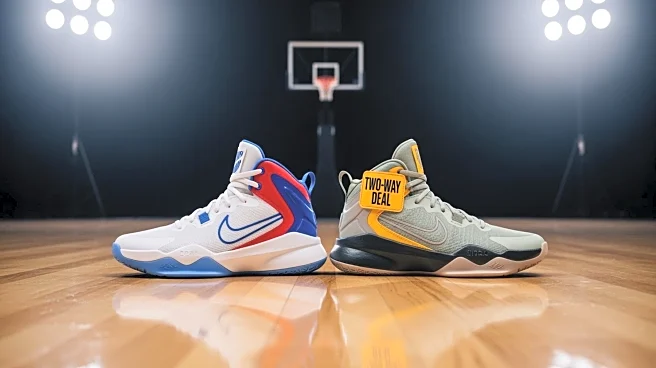What's Happening?
The Atlanta Hawks have made significant changes to their roster ahead of the regular season. Keaton Wallace, who previously held a two-way contract, has been promoted to a standard one-year deal. This decision comes after Wallace's performance in preseason
games, where he averaged 5.5 points, 5.0 assists, and 1.5 steals per game. Despite struggling with his shooting, hitting only 30.8% of his field goals and 8.3% of his three-point attempts, the Hawks see potential in Wallace to contribute more consistently. Meanwhile, Caleb Houstan's contract has been converted from an Exhibit 10 to a two-way deal. Houstan, a former Magic player, is entering his final season of two-way eligibility, joining Eli Ndiaye and Jacob Toppin as Atlanta's two-way players.
Why It's Important?
These roster changes reflect the Hawks' strategic planning for the upcoming season. By promoting Wallace to a standard contract, the team ensures his availability for all games, including the postseason, which is crucial given the lack of traditional point guard options behind Trae Young. Wallace's ability to handle the ball could be vital for the Hawks, especially in scenarios where Young needs support. Houstan's conversion to a two-way contract allows the Hawks to maintain flexibility in their roster while still benefiting from his experience. These moves indicate the team's focus on optimizing player roles and maximizing their potential contributions throughout the season.
What's Next?
As the regular season approaches, Wallace will likely have opportunities to prove his worth as a reliable backup for Trae Young. His performance in upcoming games will be crucial in determining his role and minutes on the court. Houstan, on the other hand, will aim to make the most of his two-way contract, potentially earning a more permanent spot in the future. The Hawks will continue to evaluate their roster dynamics and make adjustments as needed to enhance their competitiveness in the league.
Beyond the Headlines
The decision to convert contracts highlights the evolving nature of NBA team strategies, where flexibility and player development are prioritized. The Hawks' approach may influence other teams to reconsider how they manage player contracts, especially in balancing immediate needs with long-term potential. This could lead to broader discussions on contract structures and player utilization across the league.














